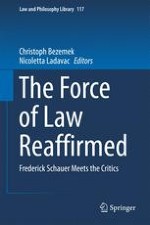2016 | OriginalPaper | Buchkapitel
The Force of Law: Law and Coercion, Validity and Effectiveness, and Synergy
verfasst von : Jorge Emilio Nunez
Erschienen in: The Force of Law Reaffirmed
Aktivieren Sie unsere intelligente Suche, um passende Fachinhalte oder Patente zu finden.
Wählen Sie Textabschnitte aus um mit Künstlicher Intelligenz passenden Patente zu finden. powered by
Markieren Sie Textabschnitte, um KI-gestützt weitere passende Inhalte zu finden. powered by
